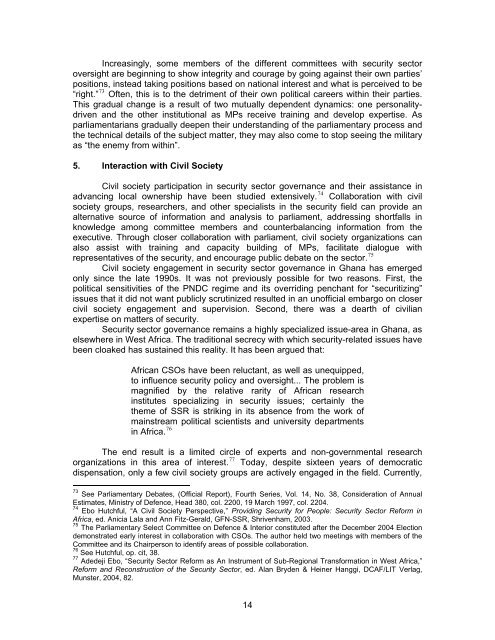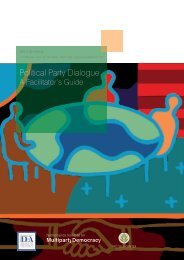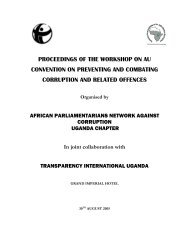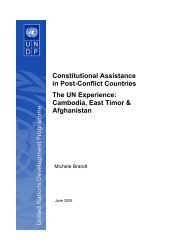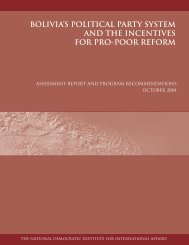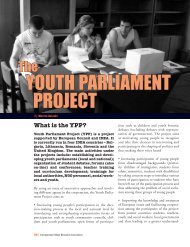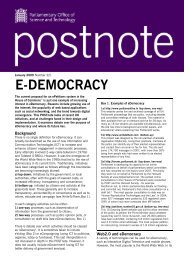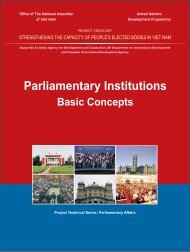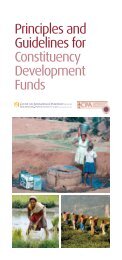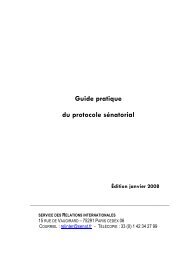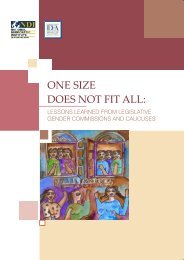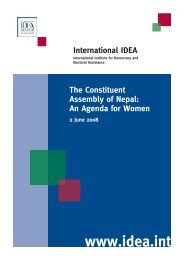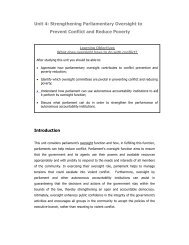Increasingly, some members <strong>of</strong> <strong>the</strong> different committees with security sectoroversight are beginning to show integrity and courage by going against <strong>the</strong>ir own parties’positions, instead taking positions based on national interest and what is perceived to be“right.” 73 Often, this is to <strong>the</strong> detriment <strong>of</strong> <strong>the</strong>ir own political careers within <strong>the</strong>ir parties.This gradual change is a result <strong>of</strong> two mutually dependent dynamics: one personalitydrivenand <strong>the</strong> o<strong>the</strong>r institutional as MPs receive training and develop expertise. Asparliamentarians gradually deepen <strong>the</strong>ir understanding <strong>of</strong> <strong>the</strong> parliamentary process and<strong>the</strong> technical details <strong>of</strong> <strong>the</strong> subject matter, <strong>the</strong>y may also come to stop seeing <strong>the</strong> militaryas “<strong>the</strong> enemy <strong>from</strong> within”.5. Interaction with Civil SocietyCivil society participation in security sector governance and <strong>the</strong>ir assistance inadvancing local ownership have been studied extensively. 74 Collaboration with civilsociety groups, researchers, and o<strong>the</strong>r specialists in <strong>the</strong> security field can provide analternative source <strong>of</strong> information and analysis to parliament, addressing shortfalls inknowledge among committee members and counterbalancing information <strong>from</strong> <strong>the</strong>executive. Through closer collaboration with parliament, civil society organizations canalso assist with training and capacity building <strong>of</strong> MPs, facilitate dialogue withrepresentatives <strong>of</strong> <strong>the</strong> security, and encourage public debate on <strong>the</strong> sector. 75Civil society engagement in security sector governance in <strong>Ghana</strong> has emergedonly since <strong>the</strong> late 1990s. It was not previously possible for two reasons. First, <strong>the</strong>political sensitivities <strong>of</strong> <strong>the</strong> PNDC regime and its overriding penchant for “securitizing”issues that it did not want publicly scrutinized resulted in an un<strong>of</strong>ficial embargo on closercivil society engagement and supervision. Second, <strong>the</strong>re was a dearth <strong>of</strong> civilianexpertise on matters <strong>of</strong> security.<strong>Security</strong> sector governance remains a highly specialized issue-area in <strong>Ghana</strong>, aselsewhere in West Africa. The traditional secrecy with which security-related issues havebeen cloaked has sustained this reality. It has been argued that:African CSOs have been reluctant, as well as unequipped,to influence security policy and oversight... The problem ismagnified by <strong>the</strong> relative rarity <strong>of</strong> African researchinstitutes specializing in security issues; certainly <strong>the</strong><strong>the</strong>me <strong>of</strong> SSR is striking in its absence <strong>from</strong> <strong>the</strong> work <strong>of</strong>mainstream political scientists and university departmentsin Africa. 76The end result is a limited circle <strong>of</strong> experts and non-governmental researchorganizations in this area <strong>of</strong> interest. 77 Today, despite sixteen years <strong>of</strong> democraticdispensation, only a few civil society groups are actively engaged in <strong>the</strong> field. Currently,73 See <strong>Parliamentary</strong> Debates, (Official Report), Fourth Series, Vol. 14, No. 38, Consideration <strong>of</strong> AnnualEstimates, Ministry <strong>of</strong> Defence, Head 380, col. 2200, 19 March 1997, col. 2204.74 Ebo Hutchful, “A Civil Society Perspective,” Providing <strong>Security</strong> for People: <strong>Security</strong> <strong>Sector</strong> Reform inAfrica, ed. Anicia Lala and Ann Fitz-Gerald, GFN-SSR, Shrivenham, 2003.75The <strong>Parliamentary</strong> Select Committee on Defence & Interior constituted after <strong>the</strong> December 2004 Electiondemonstrated early interest in collaboration with CSOs. The author held two meetings with members <strong>of</strong> <strong>the</strong>Committee and its Chairperson to identify areas <strong>of</strong> possible collaboration.76 See Hutchful, op. cit, 38.77 Adedeji Ebo, “<strong>Security</strong> <strong>Sector</strong> Reform as An Instrument <strong>of</strong> Sub-Regional Transformation in West Africa,”Reform and Reconstruction <strong>of</strong> <strong>the</strong> <strong>Security</strong> <strong>Sector</strong>, ed. Alan Bryden & Heiner Hanggi, DCAF/LIT Verlag,Munster, 2004, 82.14
<strong>the</strong>re are three key actors at <strong>the</strong> forefront <strong>of</strong> collaborating with parliament on securitysector governance: <strong>the</strong> African <strong>Security</strong> Dialogue and Research (ASDR), 78 <strong>the</strong> <strong>Ghana</strong>Centre for Democratic Development (GCDD), and <strong>the</strong> Legon Centre for InternationalAffairs (LECIA). These bodies have been collaborating efforts to enhance <strong>the</strong> capacity <strong>of</strong><strong>the</strong> <strong>Parliamentary</strong> Committee to deal with military and security issues that affect <strong>the</strong>country. They also facilitate dialogue and interactions between <strong>the</strong> security and civilsectors like <strong>the</strong> media. Additionally, The Institute for Democratic Governance (IDEG), <strong>the</strong>Foundation for <strong>Security</strong> and Development in Africa (FOSDA), <strong>the</strong> <strong>Ghana</strong> Centre forDemocratic Development (G-CDD), and <strong>the</strong> Centre for <strong>Security</strong> Studies (CSS) are alsoincreasingly gaining expertise in this field.5.1 Identifying entry points for <strong>Parliamentary</strong>-Civil Society Dialogue in <strong>Ghana</strong>Civil society’s contribution to security sector governance processes is increasingly beingdriven by demand <strong>from</strong> parliamentary select committees, <strong>the</strong> national securityinstitutions <strong>the</strong>mselves, and o<strong>the</strong>r policy-relevant agencies.The promulgation <strong>of</strong> <strong>the</strong> 1992 Republican Constitution reinstated momentum forsustained reform <strong>of</strong> security sector governance in <strong>Ghana</strong>. The democratic transition thattook place in January 2001 in <strong>Ghana</strong> expanded <strong>the</strong> democratic space for civil societyparticipation in this process. After 2001, it became apparent that concrete measureswere needed to consolidate <strong>the</strong> democratic process, particularly how to ensure fullcivilian, democratic control and fur<strong>the</strong>r pr<strong>of</strong>essionalization <strong>of</strong> <strong>the</strong> security sector.The government’s idea <strong>of</strong> collaborating with an international partner who couldassist with <strong>the</strong> design <strong>of</strong> a constructive framework to stimulate dialogue among keystakeholders within <strong>the</strong> security sector in <strong>Ghana</strong> provided an entry point for civil society.The UK <strong>Security</strong> <strong>Sector</strong> Development Advisory Team (SSDAT) was invited by <strong>the</strong>Ministry <strong>of</strong> Defence to provide technical advice on how to develop a human resourcesmanagement and development strategy for its civilian staff. It became clear that beforesuch a strategy could be developed <strong>the</strong>re was a need for greater clarity on <strong>the</strong> roles andresponsibilities <strong>of</strong> <strong>the</strong> non-military, civil service component in <strong>the</strong> MoD and itsrelationship to <strong>the</strong> military counterparts. 79The on-going capacity-building programme under <strong>the</strong> <strong>Ghana</strong> security sectorgovernance and management course has focused on <strong>the</strong> identification <strong>of</strong> roles andresponsibilities <strong>of</strong> <strong>the</strong> defense sector. It also provided an opportunity to draw upon <strong>the</strong>experiences <strong>of</strong> o<strong>the</strong>r African countries that had streng<strong>the</strong>ned <strong>the</strong> governance andmanagement structures <strong>of</strong> <strong>the</strong>ir own security systems. The intention was also to enablebroader inclusion <strong>of</strong> <strong>Ghana</strong>ian stakeholders in <strong>the</strong> security sector debate, including o<strong>the</strong>rsecurity sector institutions, parliamentarians, academia, and civil society organizations. 80Two key principles were established within this framework. First, <strong>the</strong> process needed tobe guided by pragmatism and political realism. The concern was that if such a processwas to build trust and confidence in <strong>the</strong> security system, <strong>the</strong>n <strong>the</strong>y must balance nationalsecurity needs with sustainable justice and security development. The second principlewas <strong>the</strong> recognition that, while <strong>the</strong> inception phase may be well designed it will be78 In June 2000, African <strong>Security</strong> Dialogue and Research (ASDR) in <strong>Ghana</strong> held a three-day “Roundtable on<strong>Security</strong> <strong>Sector</strong> Reform and Democratisation.” This was a ground-breaking initiative aimed at fosteringbroader dialogue on <strong>the</strong> governance <strong>of</strong> <strong>Ghana</strong>ian security forces – <strong>the</strong> first time that a civil society group hadbrought toge<strong>the</strong>r military and police <strong>of</strong>ficers, intelligence personnel, and members <strong>of</strong> <strong>the</strong> civilian policysectors including parliamentarians to discuss security related matters. The presence <strong>of</strong> <strong>the</strong> press allowed<strong>the</strong> debates to be shared with <strong>the</strong> wider public.79 OECD DAC Handbook on <strong>Security</strong> System Reform (SSR), op. cit, 38.80 Ibid, 39.15


